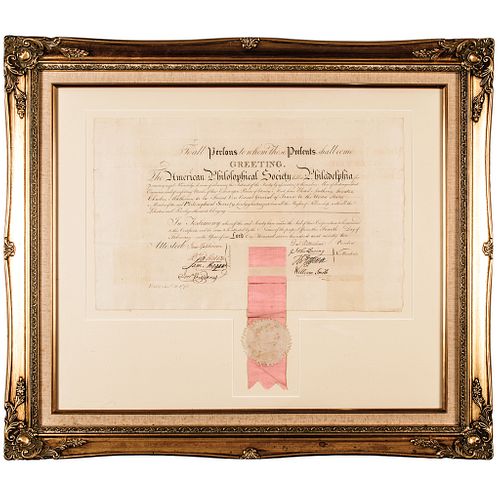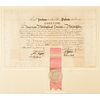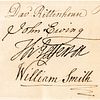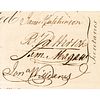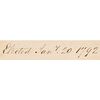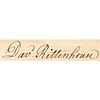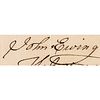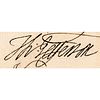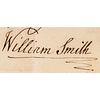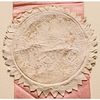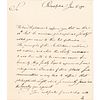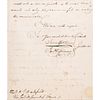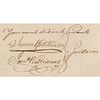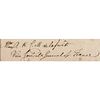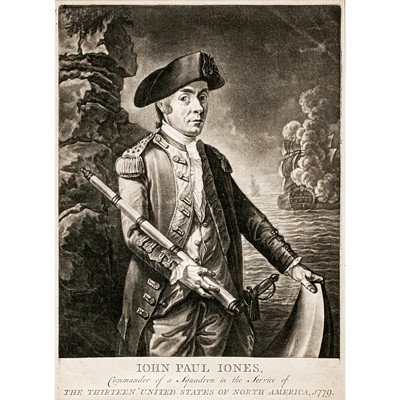1792 THOMAS JEFFERSON and DAVID RITTENHOUSE Signed Document
Lot 30
About Seller
Early American History Auctions
1520 Commerce St., #312
Winchester, VA 22601
United States
Categories
Estimate:
$15,000 - $20,000
Absentee vs Live bid
Two ways to bid:
- Leave a max absentee bid and the platform will bid on your behalf up to your maximum bid during the live auction.
- Bid live during the auction and your bids will be submitted real-time to the auctioneer.
Bid Increments
| Price | Bid Increment |
|---|---|
| $0 | $10 |
| $200 | $20 |
| $300 | $25 |
| $500 | $50 |
| $1,000 | $100 |
| $2,000 | $200 |
| $3,000 | $250 |
| $5,000 | $500 |
| $10,000 | $1,000 |
| $20,000 | $2,000 |
| $30,000 | $2,500 |
| $50,000 | $5,000 |
| $100,000 | $10,000 |
| $200,000 | $20,000 |
| $300,000 | $25,000 |
| $500,000 | $50,000 |
About Auction
By Early American History Auctions
Jan 23, 2021
Set Reminder
2021-01-23 12:00:00
2021-01-23 12:00:00
America/New_York
Bidsquare
Bidsquare : Early American History Auction of Autographs, Americana, Political & Maps
https://www.bidsquare.com/auctions/early-american-history-auctions/early-american-history-auction-of-autographs-americana-political-maps-6311
311 Lots of Rare, Historic Autographs, Americana, Civil War Era, George Washington, Abraham Lincoln, Slavery & Black History, Revolutionary War Era, Colonial America, Federal Period, War of 1812, Colonial Currency, Indian Peace Medals & more... Early American History Auctions auctions@earlyamerican.com
311 Lots of Rare, Historic Autographs, Americana, Civil War Era, George Washington, Abraham Lincoln, Slavery & Black History, Revolutionary War Era, Colonial America, Federal Period, War of 1812, Colonial Currency, Indian Peace Medals & more... Early American History Auctions auctions@earlyamerican.com
- Lot Description
Autographs
1792 "Thomas Jefferson" & "David Rittenhouse" Signed AMERICAN PHILOSOPHICAL SOCIETY Certificate with the Original Official "Membership" Notification Letter
THOMAS JEFFERSON (1743-1826). 3rd President of the United States, American Founding Father, the Principal Author of the Declaration of Independence (1776), and the Third President of the United States (1801-1809), served in the Continental Congress representing Virginia, then Revolutionary Wartime Governor of Virginia (1779-1781), Paris Diplomat in May 1785 as United States Minister to France. In 1792, James Madison and Thomas Jefferson founded the Democratic-Republican Party, U.S. Secretary of States, in 1803 made the Louisiana Purchase.
DAVID RITTENHOUSE (1732-1796). Historic Early American Astronomer, First Director of the United States Mint appointed by President George Washington, and succeeded Benjamin Franklin as President of the American Philosophical Society (1791-1796).
February 4th, 1792-Dated Federal Period, Partially-Printed Document Signed, "Th. Jefferson" as Vice President, together with "David Rittenhouse," as President of the American Philosophical Society held at Philadelphia, Choice Extremely Fine. This beautiful example is professionally framed. This ornate official Membership Certificate, also Signed by Six additional Members being notable period American Educators and Statesmen. Fully Signed and executed Membership Certificate, 1 page, Copper-Plate Engraved, with a sharp impression, measuring 8.75" x 13.5" printed within a larger 12" x 18.75" Handmade paper sheet, Oblong folio, with light transmittal folds, at Philadelphia. A historic Certificate is made to "Charles Mathurin de la Forest Vice Consul General of France to the United States", and noted in brown ink at lower left, nicely handwritten just below the copper plates outer impression on the fine quality laid period paper, "Elected Jany. 20 1792". His full name, "Antoine Ren Charles Mathurin, Comte de Lafort" (August 8, 1756 - August 2, 1846 ) was a senior French diplomat. He was Consul General of France to the United States before the French Revolution. The Certificate appears fresh and bright having vivid black text and Script portions. Completed manuscript portions are bold and clear in appearance with all signatures rated "10" appearing and strong and rich as on the day originally signed. At the time of his signing this Certificate, "Thomas Jefferson" was the acting United States Secretary of State.
This Certificate is complete, a finely penned appointment is adorned with its original 8.75" long carnation-pink Sil Ribbon. Attached to the ribbon is a blind-embossed American Philosophical Embossed Paper Seal that is extremely sharp in detail and fully intact, having been designed by Signer of the Declaration of Independence, Francis Hopkinson. Jefferson's signature is pristine, as is David Rittenhouse and the other Six additional signatories.
This Certificate is framed together With Its Original Official "Membership Notification Letter," being an Autograph Letter Signed by JONATHAN WILLIAMS (1750-1815), and JAMES HUTCHINSON (1752-1793), as Secretaries, 2 pages, 8.5" x 7.25" (by sight), 4to., at Philadelphia, dated January 25, 1792. This exceedingly rare Membership Notification ALS is displayed on the reverse side of the frame, shown under Plexiglas, with a Xerox copy of the 1st page displayed, along with the original, fully signed 2nd page. It reads, in part:
"Philadelphia Jan 25, 1792 - Sir, -- We have the pleasure to inform you that on the 20th Inst the American Philosophical Society added your name to their list of Members. - The principles of this Institution embrace all nations, and while the Society endeavors to add their mite to the common cause of humanity, they fondly hope to experience from distinguished Characters of other places, Such communications as may tend to diffuse that philosophical Light, which so eminently shines in the Country you represent.
Your certificate of membership will be made out as soon as possible, in the meantime we could not delay the pleasure we feel in making this communication. --- We are with respect - Sir Your most obedient Servants -- (Signed) James Hutchinson / Jona (Jonathan) Williams, Secretaries."
The ALS is lightly folded from transmittal with faint very minor foxing (by sight, not inspected out of the frame); otherwise in very nice condition. All being ornately frames together in a handsome modern 25" x 29" professional display, having an antique period appearance. Additional information regarding the Six other notable signers of this Document are found having more details in our Online Auction catalog at: www.EarlyAmerican.com (2 items)
The oldest extant learned Society of its kind in the United States, the American Philosophical Society was founded in 1743 by Benjamin Franklin.
Its purpose was for "prompting useful knowledge among British plantations in America". Its members included the leading scientists, scholars, statesmen and public servants of the time. In 1769 it was united with "The American Society," being another Scientific Association, also founded by Benjamin Franklin. Naturally, Benjamin Franklin was elected its First President, an office he held until his death in 1780.
Antoine Ren Charles Mathurin, comte de Lafort (8 August 1756 - 2 August 1846 ) was a senior French diplomat. He was Consul General of France to the United States before the French Revolution. In 1779 he was named Secretary to the French legation in the United States, then Vice-Consul at Savannah, Philadelphia and New York. He was made Consul-General of France in the United States in 1788. As a consul, Lafort authored reports analyzing the U.S. Constitution and the likelihood of its ratification.
Mathurin returned to France in September 1793 and became assistant to Jean Antoine Joseph Fauchet, Minister Plenipotentiary to the United States. They were dismissed on 5 November year III, but the next year on 17 July 1797 Talleyrand, head of the department of External Relations, put Laforest in charge of finance and accounting. During the First French Empire he was Ambassador in Madrid. He was briefly Minister of Foreign Affairs during the transitional government after the fall of Napoleon in 1814, and in 1815, after second abdication of Napoleon, a plenipotentiary to the Seventh Coalition powers.
Six Additional Notable American Educators and Statesmen Signing this AMERICAN PHILOSOPHICAL SOCIETY held at PHILADELPHIA Membership Certificate Include:
At the time of this Membership Appointment, Thomas Jefferson was Vice-President of the Organization.
James Hutchinson, a Revolutionary War Patriot, Physician and Surgeon, as well as Benjamin Franklin's, messenger of important dispatches in Europe. A Trustee of the University of Pennsylvania from 1779 until his death, he was Elected Chairman of the department of chemistry in 1791.
Robert Patterson (1743-1824) was a renowned Patriot, Revolutionary War Surgeon and Professor of mathematics at the University of Pennsylvania from 1779-1814, later becoming that institution's Vice-Provost. In 1805 President Thomas Jefferson appointed him Director of the U.S. Mint. Active in the American Philosophical Society, he was elected its President in 1819 and held this office until his death five years later.
Samuel Magaw (1740-1812) was a Member of the first class of the University of Pennsylvania, and, from 1782-1791, Vice-Provost of his alma mater. An educator and missionary, Magaw was honored in 1784 as a principal organizer in the early movements of the Protestant Episcopal Church of the United States by Bishop William White, the First Bishop of Pennsylvania.
Jonathan Williams, Benjamin Franklin's grand-nephew, served as the elder statesman's Secretary during his tenure as United States Ambassador in France in 1773. Williams later became Superintendent of West Point at President Jefferson's request in 1805, and was Elected to Congress in 1814, but died prior to taking his seat.
David Rittenhouse (1732-1796) was the Second President of the American Philosophical Society. Best known for his pioneering work in astronomy, he reputedly constructed the first telescope in the United States. Rittenhouse was a highly esteemed surveyor, and oversaw the establishment of state boundaries in the Northeast, New England, and Northwest Territories. He served as Pennsylvania's Treasurer from 1777 to 1789, and in 1792 President George Washington appointed him as the First Director of the U.S. Mint, a position he held for three years. Rittenhouse was chosen a Fellow of the Royal Society of London in 1795. He served as President of the American Philosophical Society until his death.
John Ewing (1732-1802) was provost of the University of Pennsylvania from 1779 until his death. A mathematician and scientist, Ewing assisted David Rittenhouse in surveying the boundaries of several states.
Clergyman William Smith (1727-1803) was the founding director of the seminary in Philadelphia, which subsequently became the University of Pennsylvania. Smith founded Washington College in 1782, and was its first president.
- Shipping Info
-
Early American provides in-house worldwide shipping. Please contact us directly if you have questions about your specific shipping requirements.
-
- Buyer's Premium



 EUR
EUR CAD
CAD AUD
AUD GBP
GBP MXN
MXN HKD
HKD CNY
CNY MYR
MYR SEK
SEK SGD
SGD CHF
CHF THB
THB